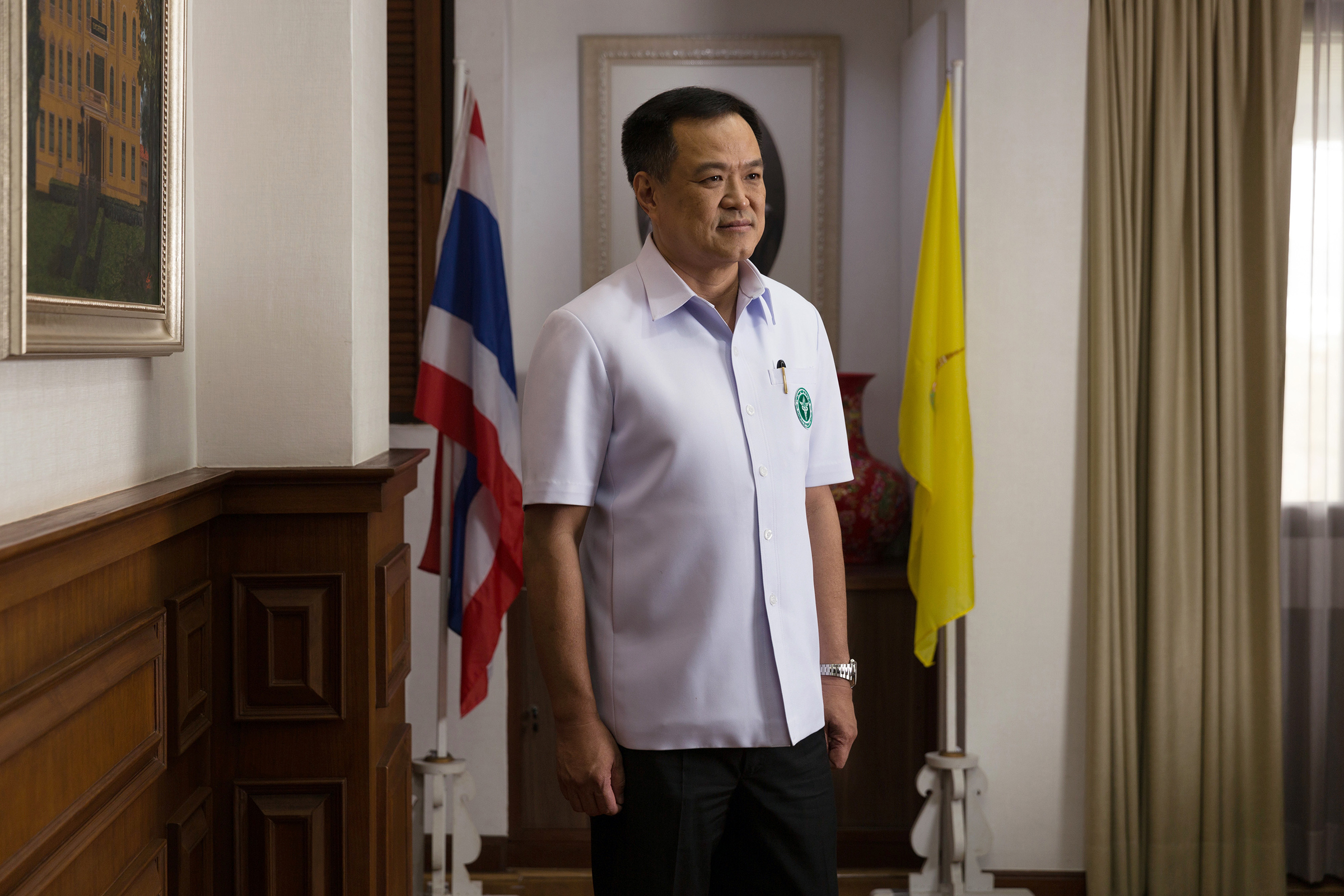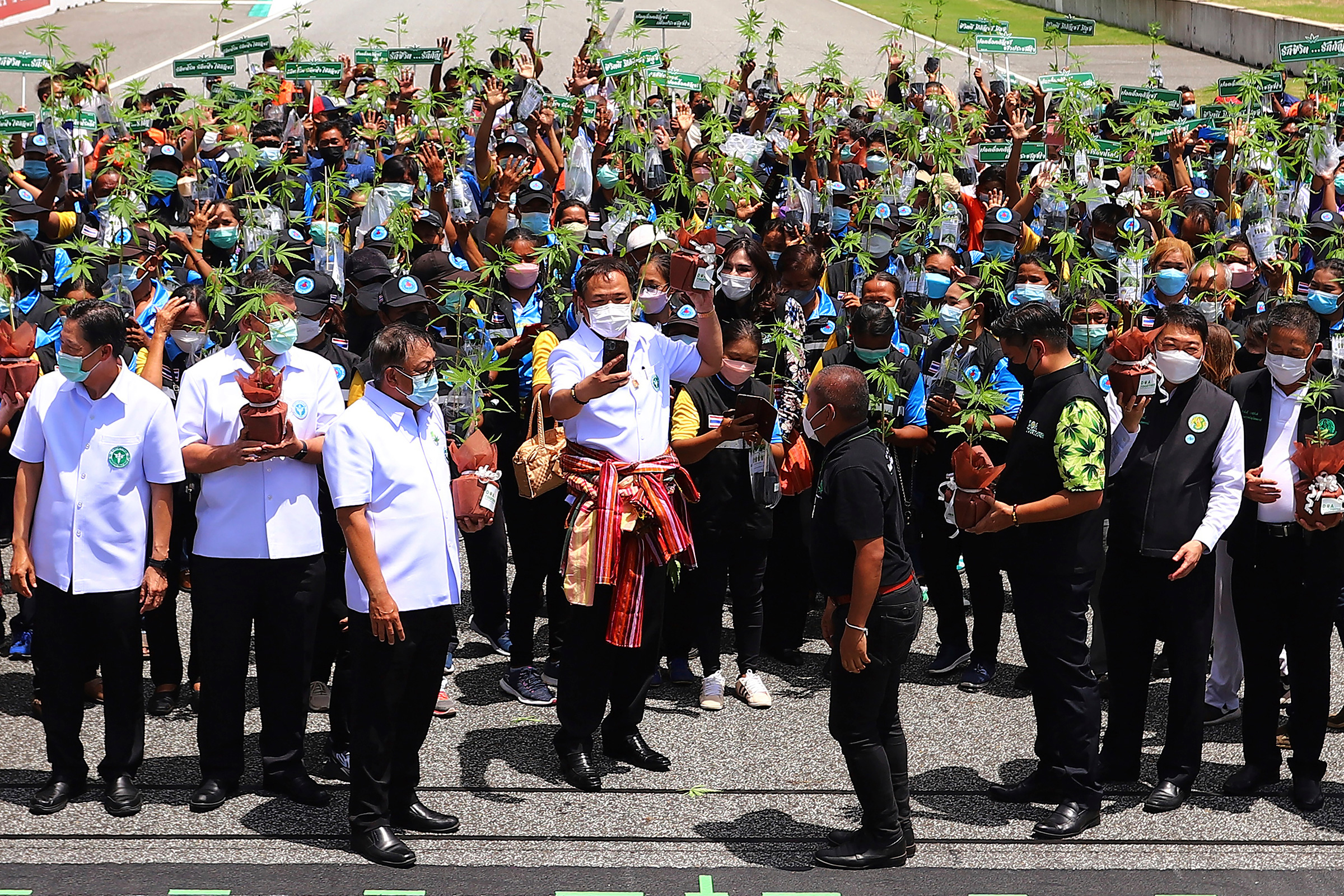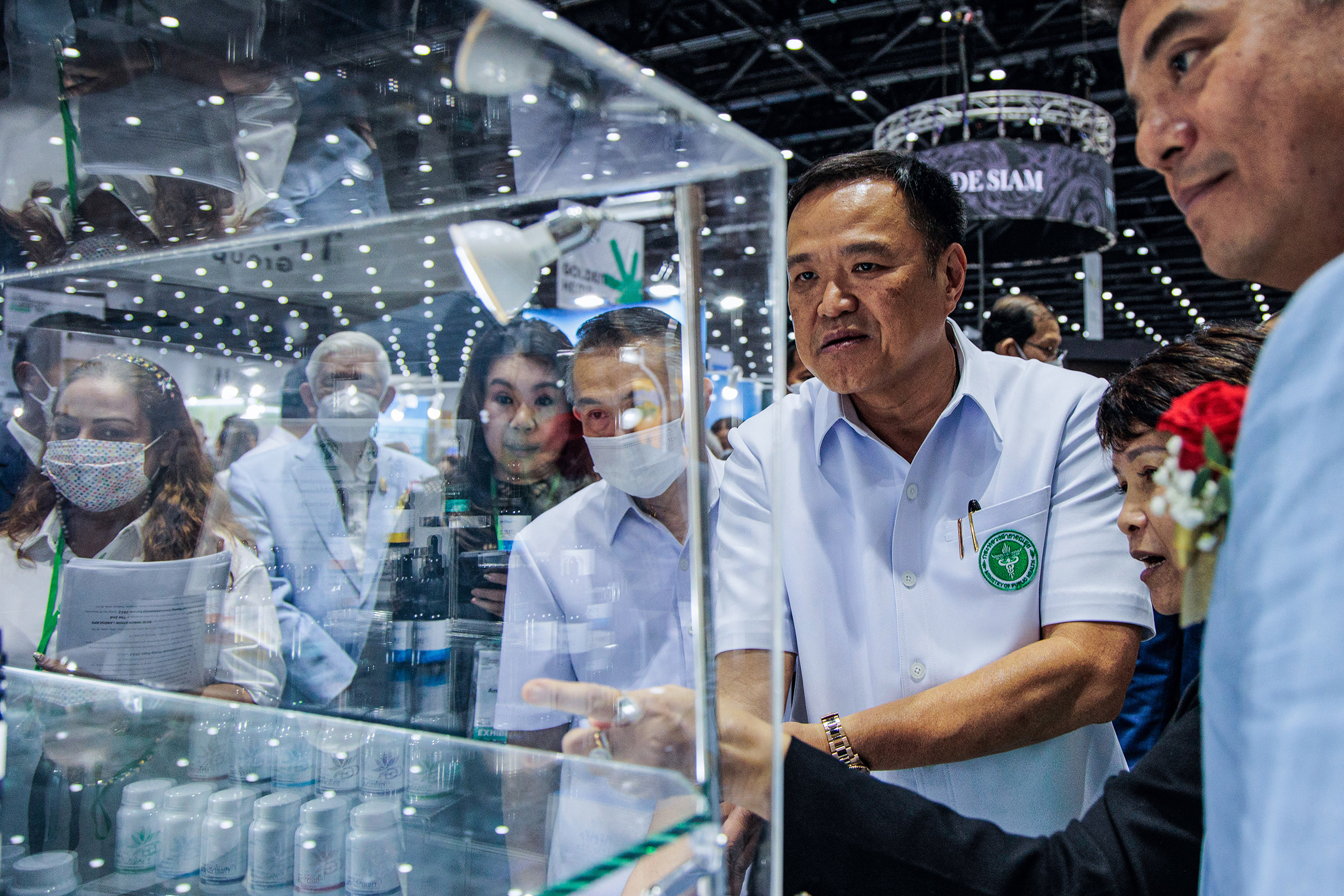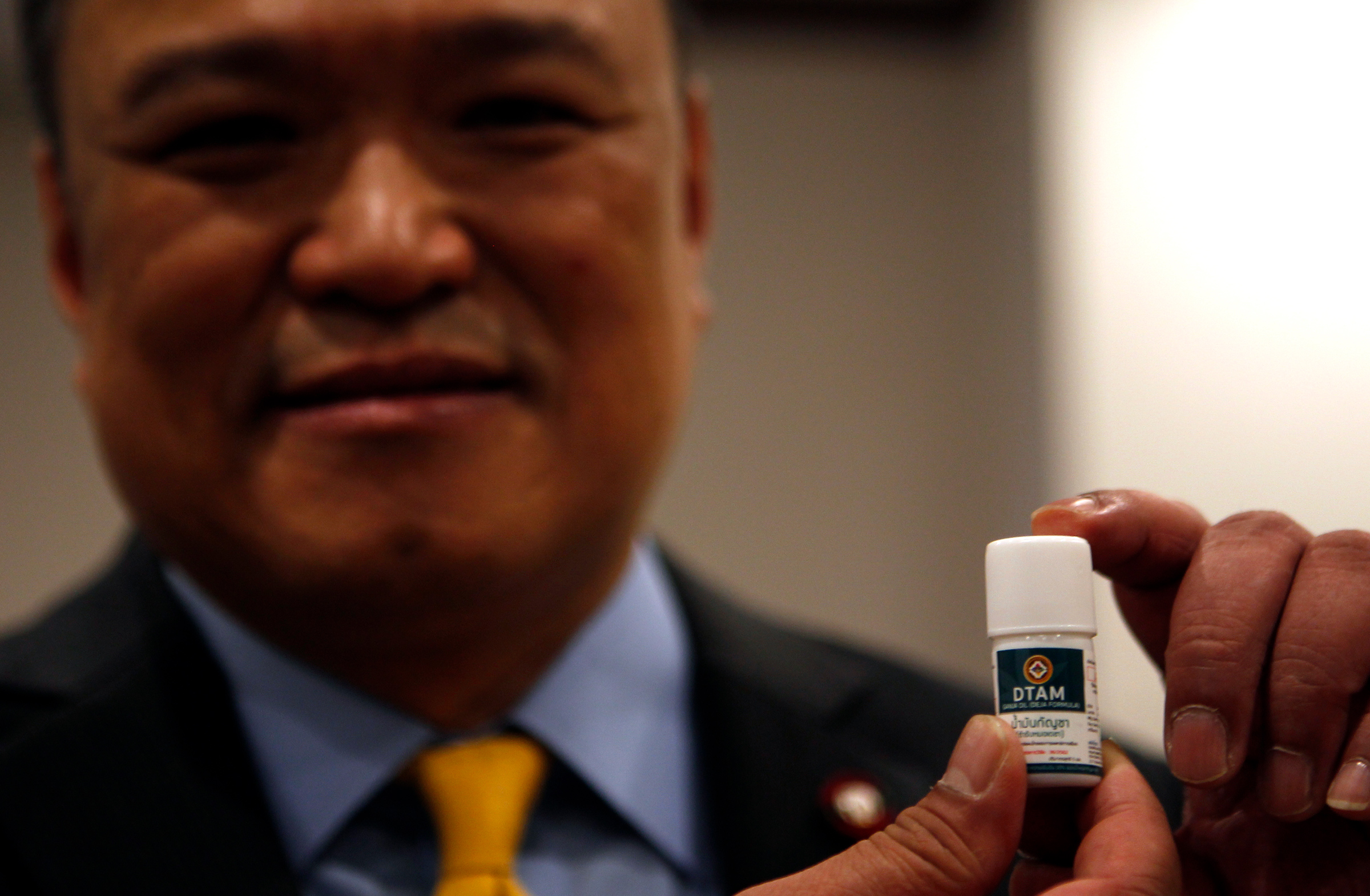
It’s a Monday in Bangkok, the Thai capital, which means all civil servants by custom don their tan military-style uniforms, and so the arm enthusiastically proffering the “ganja oil” is immaculately pressed with golden epaulets at the top. Anutin Charnvirakul, Thailand’s Health Minister and Deputy Prime Minister, unscrews the brown vial’s lid and takes a deep sniff before breaking into his trademark grin.
“Cannabis has been long stigmatized as a narcotic,” he tells TIME. “But it is no more addictive than tobacco. I consume traditional medicine droplets [of ganja oil] to help me sleep.”
Until last summer, Thailand had some of the world’s harshest drug laws. Possession of many of the products laced with cannabis derivatives that Anutin arranges on his desk in Bangkok’s Health Ministry building—such as facial scrub, tea, massage balm, hand sanitizer spray, as well as CBD oil—would have then risked a long jail sentence. But Anutin’s Bhumjaithai Party, which is today the junior partner in a military-backed ruling coalition, competed in national elections in 2019 on decriminalizing the plant, ostensibly to reduce prison overcrowding and foster a budding hemp industry. On June 9, marijuana was decriminalized and a resurgent cannabis culture has since engulfed the Southeast Asian nation of 70 million, with dispensaries peppering both its sprawling cities and chicken coop villages. The Thai cannabis market is projected to reach $9.6 billion by 2030.
More from TIME
Read More: Thailand Had Notoriously Harsh Drug Laws. Now Weed Is Legal—and That’s Making Things Complicated
“Thailand is actually the [world’s] most suitable location to grow quality cannabis,” says Anutin, a former engineer who entered politics in 1996. “We have so much knowledge from traditional medicine in Thailand and the use of cannabis extractions can cure so many illnesses and [alleviate] symptoms.”

Thailand goes to the ballot box again on May 14, and Anutin is hoping the buzz around cannabis legalization can propel him to become the nation’s next leader. He is promising another broad swath of reform, including a three-year debt moratorium for farmers; subsidies for green technology adoption; and a $3 billion land bridge spanning southern Thailand’s Isthmus of Kra.
Yet success in May’s ballot may hinge on an even more seismic undertaking. The election will once again pit the populist political machine of exiled billionaire Thaksin Shinwatra against the Bangkok-based elite power nexus centered on Thailand’s military, judiciary, and royal palace. Parties backed by Thaksin—a policeman turned media mogul, who lives overseas after being convicted of corruption (charges he denies)—have won every election since 2001 but have been ousted twice by the military and three times by the courts.
With the Thaksin-aligned Pheu Thai Party set to win yet another landslide, observers fear a renewed cycle of deadly street protests and military intervention. “A Pheu Thai prime minister would not be acceptable to the establishment,” says Thitinan Pongsudhirak, associate professor of political science at Bangkok’s Chulalongkorn University
Anutin is one of the few figures capable of bridging Thailand’s yawning political schism between the Bangkok-based elite and Thaksin’s heartland in the populous, rice-farming northeast. Bhumjaithai has welcomed 34 influential defectors from other parties in recent months and a decent showing at the ballot box could see Anutin thrust into the top job as the head of either a military-backed or majority Pheu Thai government.
“If one factor could shift the whole political equilibrium in Thailand, I think it would be Anutin,” says Pavin Chachavalpongpun, an associate professor of Southeast Asian Studies at Kyoto University in Japan.
Still, Anutin has far from an unblemished reputation, with opponents accusing his cannabis decriminalization of being chaotic, and Thailand’s pandemic response also receiving fierce criticism from certain quarters. But the burly 56-year-old says he just wants to help the nation move forward without another cycle of political upheaval. “Polarization creates differences, conflict,” he says, fixing me with an earnest stare. “We have to make a better life for our people.”

If one thing is for certain, Anutin is a hands-on politician, who is most at ease when passing gifts to tourists or 1 million free cannabis plants to farmers. Away from the office, he says his passion is flying his blue-and-white turboprop aircraft, both for fun and official engagements. “Once you’re airborne, steering a piece of steel in the air, it is meditative,” he says. And taking his public health role to impressive heights, he says he regularly uses his plane to help an old school friend who is now a renowned heart surgeon at Bangkok’s Chulalongkorn Hospital, ferrying organs back to the capital for transplant. Anutin says he’s retrieved hearts, lungs, kidneys, and eyeballs on more than 50 occasions in recent years, most recently in October.
“Most organs are harvested from road traffic accidents at night, when there are no scheduled flights,” he says. “So they call me and I take off at any time. Within three or four hours, my friend would call me and say, ‘mission complete’—the old heart is beating in a new body.”
Anutin’s own heart beats within a crafty political operator. He is a scion of Sino-Thai Engineering and Construction, one of Thailand’s largest construction firms responsible for several government mega-projects, including Bangkok’s Suvarnabhumi Airport. His father is Chavarat Charnvirakul, a former Minister of the Interior for the establishment-aligned Democrat Party. “People say that my father and I should have half of each other.” Anutin laughs. “He is a very warm person and very focused. But sometimes, in terms of making decisions, he is a lot slower than me. I’m a lot more impulsive.”
Yet nobody accused Anutin of rushing Thailand’s COVID-19 response, when he endured criticism for the slow procurement of vaccines, which lagged Southeast Asian neighbors. The National Vaccine Institute eventually issued an apology for the delay. Anutin also faced backlash following a provocative Twitter post from May 2020 that warned compatriots to “be more careful of the farang [Westerners] than other Asians. It is winter in Europe and farang come to Thailand to hide from the [COVID-19] disease. Many farang dress dirtily and don’t shower. All [Thai] hosts have to be very careful.”
The post and account were subsequently deleted and Anutin later claimed he didn’t personally send it. However, he had previously grabbed international attention after blowing up on Thai television at a foreigner who rejected his offer of a face mask, exclaiming such people “need to be kicked out of Thailand!” (Upon arriving for our interview, Anutin greeted this masked TIME reporter by remarking, “farang don’t normally like wearing masks.”)
There have also been accusations of double standards. When China opened its borders on Jan. 8 of this year amid the country’s worst COVID-19 spike, many nations including the U.S. imposed stricter entry requirements on its nationals. Anutin rescinded a vaccination requirement for foreign arrivals the following day, calling such rules “cumbersome and inconvenient,” and personally greeted the first batch of Chinese tourists at the airport with flower garlands. He denies that he was motivated by political expediency, bowing to a beleaguered but vital hospitality industry with the election looming. “All my decisions to improve the tourism industry in Thailand strictly came from health literacy,” he says.
Even Bhumjaithai’s signature cannabis policy has been anything but smooth. The plant essentially became legal by default when a deadline ran out for an inter-ministerial body to agree on new rules governing its use—because Anutin, according to well-placed sources, threatened to bring down the government if it did. Instead, the plant has been absorbed into existing laws regarding traditional medicine, meaning few proscriptions exist other than a ban on its sale to under-20s, pregnant women, and breastfeeding mothers. A draft cannabis law to clarify its status has repeatedly stalled in parliament due to inter-party bickering.
And despite the proliferation of cannabis cafes and dispensaries—three weed trucks selling joints, gummies, and bong hits were parked opposite this reporter’s Bangkok hotel—Anutin bizarrely still insists that cannabis is only available for medicinal purposes. The legalization has also placed Thailand at odds with its Asian neighbors, with nations such as Singapore vowing to prosecute its nationals who consume marijuana while overseas. Anutin insists that Thailand can eventually export cannabis to overseas markets including the U.S.; at the same time, local marijuana farmers grumble about illegally imported, cheap American weed undercutting their product.
The confusion has prompted several parties standing in the May polls to run on re-criminalizing marijuana, citing a nebulous harm to children, though industry experts believe the horse has already bolted. “It’s too late, there’s an industry around cannabis now,” says Chokwan “Kitty” Chopaka, a longtime cannabis-legalization advocate who runs her own dispensary. “There’s too many well-connected people that would need to be compensated.”

If the economics of legalized weed are unclear, Anutin’s land bridge proposal threatens to be just as hazy. It would link the Andaman Sea port of Ranong via road, rail, and gas pipeline to Chumphon on the Thai Gulf, some 60 miles away. The route would save four days compared to the default transshipment hub of Singapore, Anutin says, boosting the national coffers through hyperconnected manufacturing and industrial zones, servicing South Asia and the Middle East on one side and Southeast and East Asia on the other. “We will make the region indispensable so people will come and invest, reduce their costs, and create more opportunities,” he says.
Generations of politicians have debated whether a canal or land bridge was the best option to link the two waterways. The canal proposal has been controversial for its expense and engineering challenges—the Andaman Sea is about 3 meters higher than the Gulf of Thailand, so the route would require multiple lock gates—as well as physically dividing the bulk of Thailand from its insurgency-wracked southernmost portion. The land bridge, by contrast, should cost a fraction of the 2,000 billion baht ($66 billion) mooted for the canal and be less symbolically divisive.
“A canal would divide the nation, persuading people to think negatively,” says Anutin. “But when there’s no split, only a rail and road connection, it doesn’t bother anyone. It’s just another transportation route and would create job opportunities.”
Yet analysts have questioned whether the double transshipment of goods on both coasts would pay off. Tim Forsyth, a professor at the London School of Economics who specializes in development in Southeast Asia, says that a land bridge has large “financial and engineering challenges” to being a success.
The likelihood of Chinese firms being awarded the construction contract has also riled Washington in this new era of Great Power competition. The U.S. has been quick to accuse China of debt-trap diplomacy, swapping outstanding loans for equity in projects such as Sri Lanka’s Hambantota Port, which controversially hosted a People’s Liberation Army (PLA) vessel last year. China is reportedly already building a naval base in neighboring Cambodia and the potential for Thailand—America’s oldest treaty ally in Asia—hosting PLA vessels is a red line for Washington. U.S. Embassy officials have visited Ranong and told business leaders that China’s involvement would leech economic benefits from the local community.
But when it comes to choosing sides between the superpowers, Anutin refuses to be drawn. He points out that his ancestors hail from China’s Guangdong province and he still speaks Chinese at home, while his eight years studying and working in New York—he graduated from Hofstra University, where he studied engineering—were just as instructive to who he is today. “Both [the U.S. and China] are our good friends, we cannot take sides,” he says. “We’re not part of that conflict.”

Anutin is similarly taciturn on the issue of political interference by Thailand’s traditionally sacrosanct royal family. Since the end of absolute monarchy in 1932 and the establishment of a constitutional monarchy, Thailand has weathered 12 military coups, all of which were ostensibly approved by the palace. The monarch’s role as official arbiter is integral to the state. While Anutin’s wood-paneled office contains one large cabinet holding dozens of buddha statues, an entire wall is dedicated to photographs of Thailand’s royal Chakri Dynasty, past and present.
In recent years, however, increasing numbers of young Thais have taken to the street to demand the monarchy stop meddling in the democratic process. (An upstart political party dedicated to the cause won 17% of the vote in 2019 before it was banned.)
Thailand’s King Maha Vajiralongkorn is unpopular due to numerous personal scandals and spends much of his time overseas. Since ascending the throne in 2016, the four-times married 70-year-old has consolidated financial and military control, bringing two key army regiments under his command and gaining direct oversight over royal assets estimated in the region of $33 billion. Vajiralongkorn is protected by the world’s strictest royal defamation law—known as lèse-majesté, or Article 112—which activists say has been increasingly wielded to crush dissent.
Since November 2020, more than 200 people have been charged with Article 112 in relation to activities at pro-democracy rallies or comments on social media. On March 7, a 26-year-old man was sentenced to three years in prison for selling satirical calendars featuring a yellow duck that authorities deemed insulting to the monarch. “This case sends a message to all Thais, and to the rest of the world, that Thailand is moving further away from—not closer to—becoming a rights-respecting democracy,” said Elaine Pearson, Asia director at Human Rights Watch.
Yet Anutin insists there is “no problem” with either the palace’s role—or the draconian legislation that shields it. “Article 112 only affects people who think negatively about our monarchy,” he says. “If you live a normal life of Thai people, we don’t even feel that [Article] 112 exists. So the reformation of anything with regard to the monarchy is not on our agenda.”
It’s a position that is unlikely to win many youth votes—but it is perhaps a necessary one if Anutin is to realize his political ambitions. Even the architect of Thailand’s dramatic cannabis U-turn knows where the line is drawn. Regarding his chances of becoming prime minister, Anutin is coy.
“My destiny lies with the people’s decision,” he says, placing the ganja oil in a wicker gift basket as TIME bids farewell. “If they feel that I can deliver what they need, they will choose me to work for them.”
More Must-Reads from TIME
- Introducing the 2024 TIME100 Next
- The Reinvention of J.D. Vance
- How to Survive Election Season Without Losing Your Mind
- Welcome to the Golden Age of Scams
- Did the Pandemic Break Our Brains?
- The Many Lives of Jack Antonoff
- 33 True Crime Documentaries That Shaped the Genre
- Why Gut Health Issues Are More Common in Women
Write to Charlie Campbell / Bangkok at charlie.campbell@time.com